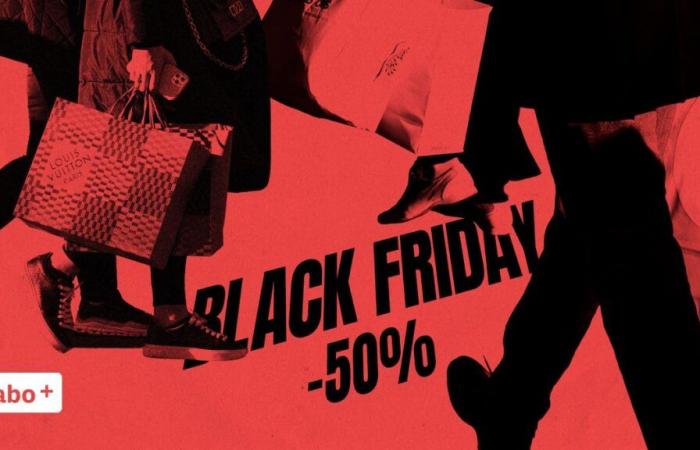What you need to know about Black Friday: The tools for the discount battle
Where the different promotional days come from, what the most popular products are and how discounts affect the brain. And how to avoid the buying spree.
Holiday for bargain hunters: Black Friday is coming.
Image: Andrea Zahler (11/18/2024)
Ducking your head doesn’t help. Another November comes to an end. And again special offers are thrown at us. Here you will find out what influence the online shop Temu has on Black Friday, how your brain reacts to special offers and how you can protect yourself from the retailers’ tricks.
Where do Black Friday & Co come from?
The Black Friday comes from the USA. The discounts were introduced because many Americans used the Friday after Thanksgiving to buy Christmas gifts. Why he is called that is unknown. Popular explanations are: Because on this day the traders are in the black. Or because their hands turn black from counting money. Or because the consuming masses of people turn the streets black. Manor was the first brick-and-mortar retailer to introduce Black Friday in Switzerland in 2015.
The Cyber Monday also comes from the USA. It was created as online retail’s response to Black Friday. It always falls on the Monday after Black Friday. Cyber Monday spilled over into Switzerland through online retailers like Amazon – even before Black Friday became established here.
The Singles Day comes from China. It always takes place on November 11th – November 11th. The four ones symbolize single people. It was probably first celebrated in the 1990s. As a day on which single students gave each other gifts. Today, online shops like Shein or Temu use Singles Day as a low price day, bringing the custom from China to Switzerland.
Why there are more and more discount battles
Once a date has been established as a promotional day, it is difficult to get rid of the discount campaigns. It would be advantageous for a company to sell a television, for example, at the traditional price. But it doesn’t know what the competition is planning. And anything is better than staying glued to the TV. So they’d rather sell cheaply than not at all.
Manor boss Roland Armbruster also confirmed that retailers are at the mercy of such discount campaigns. A year ago he said in an interview with CH Media: “Not offering discounts is no longer possible today.” It was Manor who was the first retailer to bring Black Friday to Switzerland in 2015. You could say the department store has created a monster.
What do consumers buy on Black Friday?
Which products become best sellers always depends on the offers. An analysis of the Google keywords shows: Cell phone subscriptions are currently being searched for in connection with Black Friday, as well as cell phones themselves, tablets, televisions, game consoles, clothes and furnishings.
This is also confirmed by Julian Zrotz, managing director of the bargain platform “Blackfridaydeals”. The data so far for 2024 also shows great demand for external hard drives, headphones and the half-fare card, which Interdiscount offers at half the price.
Temu and Shein are pushing Black Friday away
40 percent of Swiss want to spend less money on Black Friday this year than last year. This is the result of a survey by the software company Salesforce. According to the study, the generally rising costs are ruining consumers’ shopping budgets.
A study from Germany also finds falling interest in Black Friday – but for another reason. According to the survey by the price comparison portal “Idealo”, this is also due to Chinese shopping portals such as Temu and Shein. The year-round low prices reduce the need for the established discount campaigns in November. A survey by the Cologne market researcher IFH comes to the same conclusion.
Cheap websites like Temu and Shein are also likely to have an influence here. Temu has been selling its products in Switzerland since 2023. In its first year, the website generated sales of 350 million francs – and landed among the ten most used online shops in Switzerland, ahead of the Migros virtual store.
Do many consumers take advantage of Black Friday?
This varies from year to year. However, various surveys predict lower sales this year than last year. According to forecasts from the price comparison platform “Blackfridaydeals”, one reason for this could be the declining competition: many retailers such as M-Electronics, Sport X, Steg, Esprit and Microspot went bankrupt or were sold. This reduces the pressure to launch special offers.
Other surveys also mention the reduced purchasing power of the Swiss. Inflation could also result in lower sales for the retail trade this November than last year.
What tricks does the retail trade use?
The discounts are artificially limited over a short period of time. “Come quickly, now,” the trade entices, “then I’ll give you a discount.” At the same time, the customer is put under pressure: “Come now, or you’ll miss something; You’ll be annoyed later if you don’t grab it.” Shortage of time is part of the repertoire. Sometimes the simple hint is enough: “While stocks last.”
Or what is aptly called “Christmas creep” in English: The decorations, the music, the whole Christmas paraphernalia is put up long before December. This puts customers in the shopping mood early on. Dull shopping is stylized into a groundbreaking event with all the marketing noise of Black Fridays, Single Days and Cyber Mondays. This creates a kind of collective psychosis; American experts speak of a herd mentality. Everything runs into the stores because the hype is omnipresent.
How can consumers protect themselves?
Customers who want to emerge victorious from the discount battle should be aware of their own shortcomings before going to the store. The ability to act sensibly is severely weakened when there are bargains.
Because whether you snort a line of coke or hunt for bargains makes little difference. At least not according to Christian Elger. The German researcher examined the brain waves of subjects while they shopped digitally. Elger discovered that the brain releases the happiness hormone dopamine when there are bargains. And that reduced prices have a similar effect on us as drugs. In an interview he once said: “Discount signals work like cocaine.”
Customers therefore have to protect themselves from their own self, which is looking for a quick kick in the shopping frenzy. It helps, for example, to write down a shopping list beforehand. And then stick to it adamantly. Another option is to think about the following before buying: What will my friends or partner say when I tell them about the purchase?
Latest news from the field of economics






